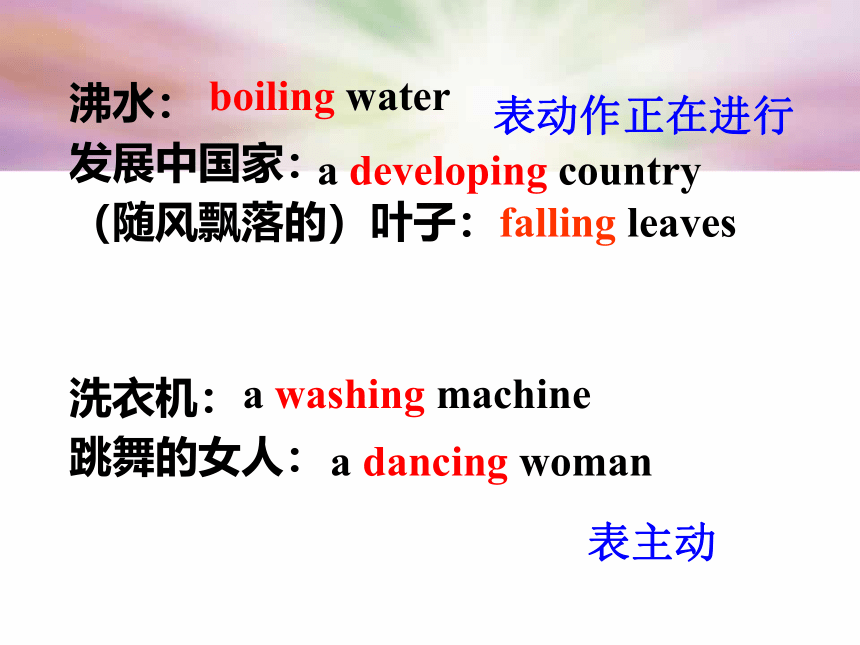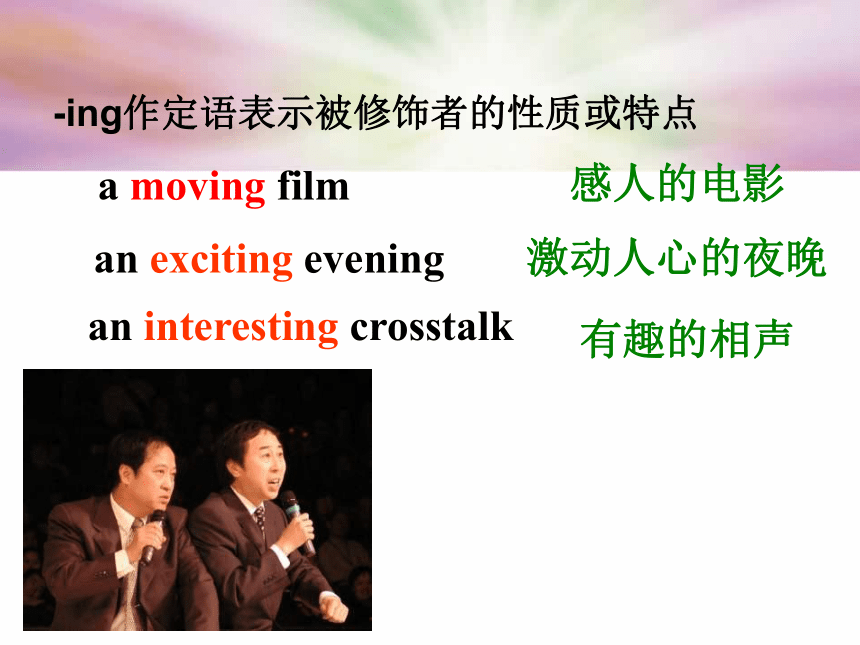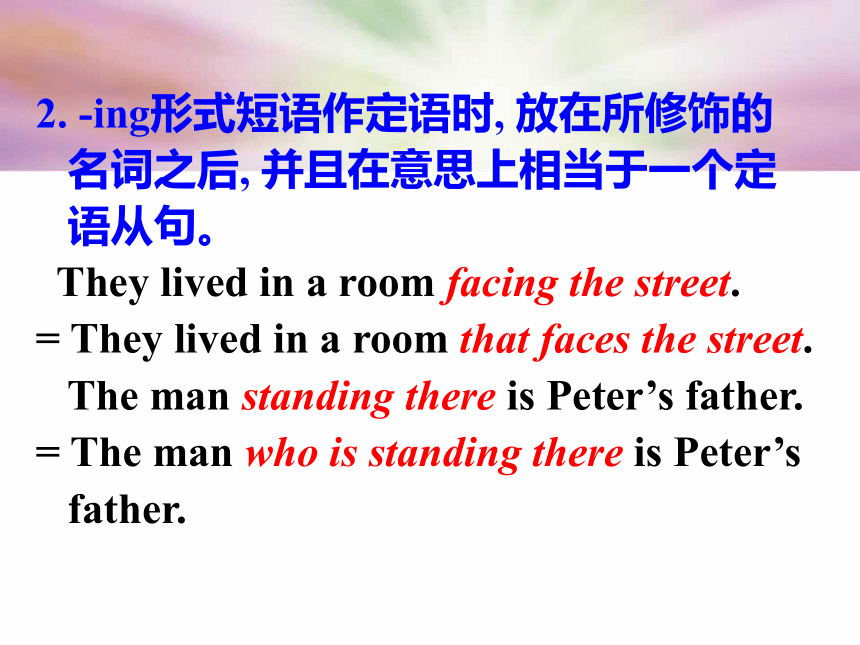人教版(新课标)高中英语必修四Unit 3 A taste of English humour-V-ing做表语-定语及宾补 课件(30张ppt)
文档属性
| 名称 | 人教版(新课标)高中英语必修四Unit 3 A taste of English humour-V-ing做表语-定语及宾补 课件(30张ppt) |  | |
| 格式 | zip | ||
| 文件大小 | 594.5KB | ||
| 资源类型 | 教案 | ||
| 版本资源 | 人教版(新课程标准) | ||
| 科目 | 英语 | ||
| 更新时间 | 2021-06-10 08:37:18 | ||
图片预览












文档简介
(共30张PPT)
—used
as
Object
Complement,
Predicative
and
Attribute
He
had
a
gift
for
acting.
Acting
was
his
job.
(
subject)
(
object)
Review:
-ing形式作主语和宾语
作主语
1.
_____________is
talking
to
a
wall.
对他说话等于对牛弹琴。
2.
It
is
no
use
_______
here.
在这里等是没有用处的。
3.
_______
is
my
sole
exercise.
散步是我唯一的运动。
4.
_______
mends
no
holes.
(谚)空谈无济于事。
Talking
to
him
Walking
Talking
waiting
作宾语
5.
I
suggest
____________________________.
我建议结束会议。
6.
He
admitted
_________________.
他承认钱是他拿的。
7.
I
couldn’t
help
_________.
我禁不住笑了起来。
8.
Your
coat
needs
_________.
你的大衣需要刷一下。
ending
the
meeting
taking
the
money
laughing
painting
动词-ing形式作:
①定语
(相当于形容词)
②表语
(相当于宾语)
③宾语补足语
(补充说明宾语)
一、-ing形式作定语
1.
单个动词的-ing形式作定语,位于被修饰名词的前面,表作用或主动的、正在进行的动作。
drinking
water
=
water
for
drinking
a
walking
stick
=
a
stick
for
walking
a
reading
room
=
a
room
for
reading
表作用
沸水:
发展中国家:
(随风飘落的)叶子:falling
leaves
洗衣机:
跳舞的女人:
表动作正在进行
表主动
boiling
water
a
developing
country
a
washing
machine
a
dancing
woman
-ing作定语表示被修饰者的性质或特点
an
exciting
evening
a
moving
film
an
interesting
crosstalk
有趣的相声
激动人心的夜晚
感人的电影
2.
-ing形式短语作定语时,
放在所修饰的名词之后,
并且在意思上相当于一个定语从句。
They
lived
in
a
room
facing
the
street.
=
They
lived
in
a
room
that
faces
the
street.
The
man
standing
there
is
Peter’s
father.
=
The
man
who
is
standing
there
is
Peter’s
father.
二、-ing形式作表语
-ing形式作表语时,放在系动词be,
become,
get(变得),
look(看起来),
seem,
appear(似乎),
sound
(听起来),
feel
(摸起来),
keep等之后。
①It
sounds
interesting.
②The
book
seems
boring.
③Chaplin
became
popular
later.
④她的爱好是画画。
Her
hobby
is
painting.
⑤我的工作就是照顾这些孩子。
My
job
is
looking
after
the
children.
①
I
found
a
bag
lying
on
the
ground.
我发现地板上放着一个包。
②我们发现蛇正在吃鸡蛋。
We
found
the
snake
eating
the
eggs.
③
那老板让工人整夜地工作。
The
boss
kept
the
workers
working
the
whole
night.
三、-ing形式作宾语补足语
1.
动词-ing形式作宾语补足语,常放在
宾语后面,表示一个正在进行的主动性
的动作,强调一个过程或一种状态。
e.g.
When
we
returned
to
the
school,
we
found
a
stranger
standing
at
the
entrance.
当我们回到学校时,
发现一个陌生人站在大门口。
.
能用-ing形式作宾语补足语的几类动词:
(1)
表示感觉和心理状态的动词。
感官动词
+
sb.
+v-ing.
三看:see,look
at,watch
两听:hear,listen
to
一感觉:
feel
一注意:notice
一观察:observe
①We
saw
a
light
burning
in
the
window.
②
Listen
to
the
birds
singing.
③I
didn’t
notice
him
waiting.
v-ing表示经常性,正在进行的动作;
(to)
do
表示完整的动作,即动作的全过程。
I
found
her
playing
the
violin
just
now.
(正在进行的动作)
I
found
her
play
the
violin
yesterday.
(完整的动作)
Do
you
hear
someone
knocking
at
the
door?
(正在进行的动作)
I
heard
someone
knock
at
the
door
three
times.
(完整的动作)
2)
表示指使意义的动词,常见的有have,
set,
keep,
get,
catch,
leave等。
①I
won’t
have
you
doing
that.
②This
set
me
thinking.
③I’m
sorry
to
have
kept
you
waiting.
④I
can’t
get
the
clock
going
again.
⑤You
won’t
catch
me
doing
that
again.
你看吧,我决不会做那种事了。
We
find
thousands
of
houses
falling
in
the
earthquake.
pray(祈祷)
We
see
people
praying
for
the
deaths.
Please
read
the
sentences
carefully,
trying
to
pick
out
the
errors
and
then
correct
them.
1.
I
am
looking
forward
to
visit
Charlie
Chaplin
Museum
in
Switzerland
next
week.
visiting
2.
We
are
all
fond
of
Charlie’s
early
films,
which
we
think
are
more
interested.
3.
I
missed
to
see
the
beginning
of
the
film
City
Lights
the
other
day.
4.
I
wouldn’t
mind
to
see
The
Gold
Rush
again
with
you
tonight.
interesting
seeing
seeing
5.
Charlie’s
job
was
entertain
people,
wasn’t
he?
entertaining
2.Translation
饮用水
拐杖
卧铺车
跳舞的女孩
发展中国家
飘落的叶子
写字台
舞厅
洗衣机
drinking
water
a
walking
stick
a
sleeping
car
a
dancing
girl
developing
countries
a
dancing
hall
falling
leaves
a
writing
desk
a
washing
machine
1.这个新闻令人震惊。
The
news
is
________.
2.他刚说的话让人迷惑。
What
he
said
is
_________.
3.玛丽的工作就是教孩子们跳舞。
Mary's
job
is
______________________.
shocking
puzzling
teaching
children
to
dance
从
A、B、C、D
四个选项中,选出
可以填入空白处的最佳选项。
1.
He
looked
around
and
caught
a
man
_______
his
hand
into
the
pocket
of
a
passenger.
A.
put
B.
to
be
putting
C.
to
put
D.
putting
2.
The
film
was
really_____.We
were
greatly
_____while
seeing
it.
A.
moving;moving
B.
moved;moved
C.
moving;
moved
D.
moved;moving
3.
—Come
on,
please
give
me
some
ideas
about
the
project.
—Sorry.
With
so
much
work
___
my
mind,
I
almost
break
down.
A.
filled
B.
filling
C.
to
fill
D.
being
filled
5.
I
smell
something
_______
in
the
kitchen.
Can
I
call
you
back
in
a
minute?
A.
burning
B.
burnt
C.
being
burnt
D.
to
be
burnt
4.
Peter
received
a
letter
just
now
_______
his
grandma
would
come
to
see
him
soon.
A.
said
B.
say
C.
saying
D.
to
say
6.
It
is
believed
that
if
a
book
is
_______,
it
will
surely
_______
the
reader.
A.
interested;
interest
B.
interesting;
be
interested
C.
interested;
be
interesting
D.
interesting;
interest
7.The
professor
_____a
speech
on
the
stage
now
is
from
Beijing
University.
A.to
give
B.
giving
C.
given
D.gave
8.
I
didn't
notice
anyone______away
your
paper.
A.
take
B.taking
C.to
take
D.took
9.They
are
seen
____in
by
the
back
door,
but
nobady
found
them______
.
A.
come;
learning
B.coming;
learn
C.
to
come;
learn
D.
to
come;
learning
—used
as
Object
Complement,
Predicative
and
Attribute
He
had
a
gift
for
acting.
Acting
was
his
job.
(
subject)
(
object)
Review:
-ing形式作主语和宾语
作主语
1.
_____________is
talking
to
a
wall.
对他说话等于对牛弹琴。
2.
It
is
no
use
_______
here.
在这里等是没有用处的。
3.
_______
is
my
sole
exercise.
散步是我唯一的运动。
4.
_______
mends
no
holes.
(谚)空谈无济于事。
Talking
to
him
Walking
Talking
waiting
作宾语
5.
I
suggest
____________________________.
我建议结束会议。
6.
He
admitted
_________________.
他承认钱是他拿的。
7.
I
couldn’t
help
_________.
我禁不住笑了起来。
8.
Your
coat
needs
_________.
你的大衣需要刷一下。
ending
the
meeting
taking
the
money
laughing
painting
动词-ing形式作:
①定语
(相当于形容词)
②表语
(相当于宾语)
③宾语补足语
(补充说明宾语)
一、-ing形式作定语
1.
单个动词的-ing形式作定语,位于被修饰名词的前面,表作用或主动的、正在进行的动作。
drinking
water
=
water
for
drinking
a
walking
stick
=
a
stick
for
walking
a
reading
room
=
a
room
for
reading
表作用
沸水:
发展中国家:
(随风飘落的)叶子:falling
leaves
洗衣机:
跳舞的女人:
表动作正在进行
表主动
boiling
water
a
developing
country
a
washing
machine
a
dancing
woman
-ing作定语表示被修饰者的性质或特点
an
exciting
evening
a
moving
film
an
interesting
crosstalk
有趣的相声
激动人心的夜晚
感人的电影
2.
-ing形式短语作定语时,
放在所修饰的名词之后,
并且在意思上相当于一个定语从句。
They
lived
in
a
room
facing
the
street.
=
They
lived
in
a
room
that
faces
the
street.
The
man
standing
there
is
Peter’s
father.
=
The
man
who
is
standing
there
is
Peter’s
father.
二、-ing形式作表语
-ing形式作表语时,放在系动词be,
become,
get(变得),
look(看起来),
seem,
appear(似乎),
sound
(听起来),
feel
(摸起来),
keep等之后。
①It
sounds
interesting.
②The
book
seems
boring.
③Chaplin
became
popular
later.
④她的爱好是画画。
Her
hobby
is
painting.
⑤我的工作就是照顾这些孩子。
My
job
is
looking
after
the
children.
①
I
found
a
bag
lying
on
the
ground.
我发现地板上放着一个包。
②我们发现蛇正在吃鸡蛋。
We
found
the
snake
eating
the
eggs.
③
那老板让工人整夜地工作。
The
boss
kept
the
workers
working
the
whole
night.
三、-ing形式作宾语补足语
1.
动词-ing形式作宾语补足语,常放在
宾语后面,表示一个正在进行的主动性
的动作,强调一个过程或一种状态。
e.g.
When
we
returned
to
the
school,
we
found
a
stranger
standing
at
the
entrance.
当我们回到学校时,
发现一个陌生人站在大门口。
.
能用-ing形式作宾语补足语的几类动词:
(1)
表示感觉和心理状态的动词。
感官动词
+
sb.
+v-ing.
三看:see,look
at,watch
两听:hear,listen
to
一感觉:
feel
一注意:notice
一观察:observe
①We
saw
a
light
burning
in
the
window.
②
Listen
to
the
birds
singing.
③I
didn’t
notice
him
waiting.
v-ing表示经常性,正在进行的动作;
(to)
do
表示完整的动作,即动作的全过程。
I
found
her
playing
the
violin
just
now.
(正在进行的动作)
I
found
her
play
the
violin
yesterday.
(完整的动作)
Do
you
hear
someone
knocking
at
the
door?
(正在进行的动作)
I
heard
someone
knock
at
the
door
three
times.
(完整的动作)
2)
表示指使意义的动词,常见的有have,
set,
keep,
get,
catch,
leave等。
①I
won’t
have
you
doing
that.
②This
set
me
thinking.
③I’m
sorry
to
have
kept
you
waiting.
④I
can’t
get
the
clock
going
again.
⑤You
won’t
catch
me
doing
that
again.
你看吧,我决不会做那种事了。
We
find
thousands
of
houses
falling
in
the
earthquake.
pray(祈祷)
We
see
people
praying
for
the
deaths.
Please
read
the
sentences
carefully,
trying
to
pick
out
the
errors
and
then
correct
them.
1.
I
am
looking
forward
to
visit
Charlie
Chaplin
Museum
in
Switzerland
next
week.
visiting
2.
We
are
all
fond
of
Charlie’s
early
films,
which
we
think
are
more
interested.
3.
I
missed
to
see
the
beginning
of
the
film
City
Lights
the
other
day.
4.
I
wouldn’t
mind
to
see
The
Gold
Rush
again
with
you
tonight.
interesting
seeing
seeing
5.
Charlie’s
job
was
entertain
people,
wasn’t
he?
entertaining
2.Translation
饮用水
拐杖
卧铺车
跳舞的女孩
发展中国家
飘落的叶子
写字台
舞厅
洗衣机
drinking
water
a
walking
stick
a
sleeping
car
a
dancing
girl
developing
countries
a
dancing
hall
falling
leaves
a
writing
desk
a
washing
machine
1.这个新闻令人震惊。
The
news
is
________.
2.他刚说的话让人迷惑。
What
he
said
is
_________.
3.玛丽的工作就是教孩子们跳舞。
Mary's
job
is
______________________.
shocking
puzzling
teaching
children
to
dance
从
A、B、C、D
四个选项中,选出
可以填入空白处的最佳选项。
1.
He
looked
around
and
caught
a
man
_______
his
hand
into
the
of
a
passenger.
A.
put
B.
to
be
putting
C.
to
put
D.
putting
2.
The
film
was
really_____.We
were
greatly
_____while
seeing
it.
A.
moving;moving
B.
moved;moved
C.
moving;
moved
D.
moved;moving
3.
—Come
on,
please
give
me
some
ideas
about
the
project.
—Sorry.
With
so
much
work
___
my
mind,
I
almost
break
down.
A.
filled
B.
filling
C.
to
fill
D.
being
filled
5.
I
smell
something
_______
in
the
kitchen.
Can
I
call
you
back
in
a
minute?
A.
burning
B.
burnt
C.
being
burnt
D.
to
be
burnt
4.
Peter
received
a
letter
just
now
_______
his
grandma
would
come
to
see
him
soon.
A.
said
B.
say
C.
saying
D.
to
say
6.
It
is
believed
that
if
a
book
is
_______,
it
will
surely
_______
the
reader.
A.
interested;
interest
B.
interesting;
be
interested
C.
interested;
be
interesting
D.
interesting;
interest
7.The
professor
_____a
speech
on
the
stage
now
is
from
Beijing
University.
A.to
give
B.
giving
C.
given
D.gave
8.
I
didn't
notice
anyone______away
your
paper.
A.
take
B.taking
C.to
take
D.took
9.They
are
seen
____in
by
the
back
door,
but
nobady
found
them______
.
A.
come;
learning
B.coming;
learn
C.
to
come;
learn
D.
to
come;
learning
同课章节目录
